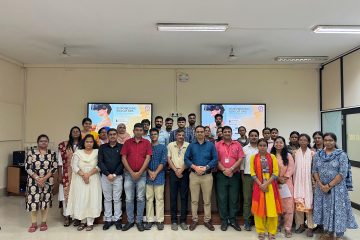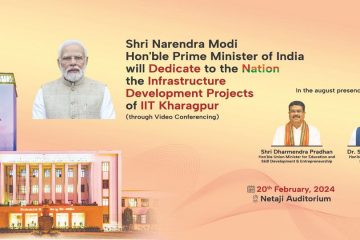Evolving Smart Education System – the 2020 Transformation at IIT Kharagpur
The year 2020 has brought a paradigm shift in our lifestyle and livelihoods. The higher education sector is probably among those to have witnessed the most climacteric effect in India with nearly 38 million students pursuing their education in online mode with e-Learning being explored like never before. While in the initial academic semesters, institutions relied mostly on video conferencing software such as Webex for classroom teaching and Moodle for assignments, a host of platforms were adopted as the year progressed, along with evolving new pedagogy for a better student experience.
Adopting Technical Aids
India’s premier institute IIT Kharagpur which caters to about 14000 students, collaborated with Microsoft and ‘prepbuddies’ for interactive online education. MS Teams enabled quick conversation with students, sharing of files and web links, built-in e-notebook for the classroom, management of interactive lessons and assignments.
“MS Teams was of great use as the lectures could be recorded and students could watch them in hindsight while being connected to their professors at all times for doubt clearing thus giving an enhanced learning experience,” said Pranjal Shukla, a third-year student from the Dept. of Civil Engineering.
The AI-based platform ‘prepbuddies’ developed by IIT Kharagpur alumnus Dharmendra Verma, was used for digital dissemination of the classroom resources, practice work, assignments and monitoring student performance analytics.
Prof. Siddhartha Mukhopadhyay, Head, Dept. of Electrical Engineering and School of Energy Science and Engineering opined on the unified experience students had on ‘prepbuddies’ through recorded videos of classes and discussion forums in addition to live classes. The evolving status of the software further makes it more dynamic in terms of new features, he added.
Evolving the Teaching and Learning Process
While technical aids and software have powered the wheels of online education, the process of online delivery of lessons and tracking progress had to be redefined.
“This new mode of online lecture delivery did not restrict the teachers’ innovation, rather paved a way to become more innovative. As a result, new modes of assignments, lecture delivery like showing graphics and relevant video demonstrations are adopted as components of the lecture delivery process. The lectures are no longer restricted to PPT but involve derivations being shown using various applications,” remarked Prof. G P Raja Sekhar, Dean, Faculty of Sciences.
In terms of evaluation and progress tracking, comprehensive-type open-book exams, as well as time-bound pen and paper type tests, were conducted. Post-exam students submitted scanned answer scripts by email within 10-15 minutes after they could complete the technical processing. Annanya Singh, a fourth-year Aerospace Engineering student remarked on how the added monitoring by teaching assistants during online class tests, made the test experience more realistic.
New Semester Plan
For the upcoming Spring 2021 semester, teachers have been recommended to use graphics enabled tablets, engage in regular two-way interactions with students during classes.
Prof. Joy Krishna Dey, Associate Dean, Faculty of Sciences, said, “One option is creating multiple sets of question papers keeping the nature of each question intact. This can be further coupled with random MCQs with shuffled options. We already conducted online quizzes similar to GATE with a mixture of MCQ and NAT type questions in the Autumn semester using Microsoft Teams.”
Shikha Bagaria, a second-year student from the Dept. of Chemical Engineering felt that the rush which was felt in the previous semester due to the transition will be addressed as the Spring semester is expected to start at the usual time and with better management of the online process.
The Challenges of Online Education
A key issue in online education that has remained unresolved till now is the hardware and network facilities. Akshat Jain, a fourth-year student from the Dept. of Agricultural and Food Engineering lauded the overall arrangements despite challenges but shared his concern regarding the continuous evaluation system which turned out to be difficult for a number of students without proper online facilities at home.
Mulling over the matter, Prof. Raja Sekhar said, “This issue needs to be addressed at a more macro level beyond the scope of an individual institute. We did a survey to identify the status of the internet connectivity of the students. The output results are being analyzed to develop diverse modes of tutorial and teaching communication.”
Another area that remains a challenge is the laboratory classes. In addition to the virtual labs platform being promoted by the Ministry of Education, some experiments can be demonstrated through specialized online videos while others conducted through computational models.
“Students are being encouraged to run experiments using sensors, tools, electrical and electronic components that can be bought from online marketplaces thus enabling them to build their own micro-labs wherever possible,” said Prof. Siddhartha Mukhopadhyay.
Most of the laboratory subjects however have been deferred until the students are back on campus due to the implausibility of conducting the experiments.
In a recent PanIIT USA forum experts pointed out that 97% of the IIT students and their families want to go back to their campuses, Director, Prof. Virendra Tewari insisted that for IIT education, a hybrid model is not a practical solution more so in the postgraduate level.
“We will be calling back students in a phase-wise manner who would go through quarantine before returning to their labs,” he said.



